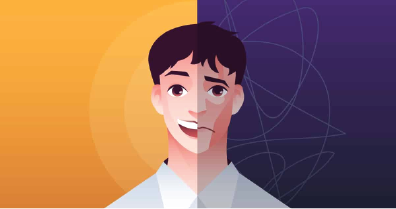
Article by
We've all experienced that feeling of having 'mixed feelings' at some point. This is such a common human experience to the extent that we have a specific word describing this state of being. It's called ambivalence.
If we as a species have been dealing with this for ages; why can't we figure out why we have this 'problem' and potential solutions to eliminate it? Apparently, mixed emotions are a sign of emotional maturity and intelligence. That's just what Psychology Today had to say. However, the 'science' of it all is that as we grow as people we recognize conflicting aspects of being human. So it's opening up to new ideas or feelings to be precise. However, we do just do so as a coping mechanism. Yeah, there's the dark side to it all too. Mixed emotions can often be an important strategy in coping with negative life events.
Then how do we navigate these 'mixed feelings' in a relationship? How do we discern if this is growth or are we just trying to cope and survive? According to Giulia Zoppolat, a psychologist at Vrije University in Amsterdam, we're bound to experience ambivalence when we're attracted to someone other than our partner. So, it's not the fact that you have options, but you're interested in them. The more we think about it, try to rationalize it, weigh the pros and cons between our partner and 'the alternative' the greater the ambivalence. So, thinking about it and talking about it doesn't really help.
Too often you're told to 'think with your head not your heart' in these circumstances. Turns out thinking isn't helping resolve the emotional duality. Even when you act on those feelings of attraction towards 'the alternative' you still have feelings for your partner. Which might lead to the territory of understanding infidelity. Where people might start preaching 'polyamory' is how we're meant to be and monogamy is a lie. Given how people who resort to infidelity would rather do that than break ties. However, many studies found motivation for cheating to be anger, self-esteem, lack of love, low commitment, need for variety, neglect, sexual desire, and situation or circumstance. With people seemingly seeking emotional fulfillment when the x failed to obtain that from their primary partner. With one study sharing how much of the sexual activity in infidelity was limited to kissing, in 86.7 percent of cases, and cuddling in 72.9 percent of cases. While circumstantial cheating wasn't even fulfilling. In fact, the study found that only half of the cheaters reported having vaginal intercourse, even those who cheated due to motives such as need for variety and sexual desire. Even if the primary partner did not find out and leave, or eventually leave given the problems in the relationship, rarely did infidelity lead to a real relationship. Only one out of 10 of the affairs in the above mentioned study led to a full blown relationship.
So can we really say, we're looking to foster multiple romantic connections? Why the 'mixed feelings' even then? Sustaining multiple romantic connections consumes so much energy. Isn't that worth it for double, triple the output? That's just it, the output of a connection includes both the good and the bad. What leads us to consider 'the alternative' to begin with? In that moment when we rationalize, why don't we consider how 'the alternative' will come with their own share of emotional ambivalence?
Will emotional ambivalence in a relationship be an eternal struggle? Even loads of studies haven't really answered 'how do I get over this'? It seems in the end it's all circumstantial. Will we grow together or grow apart? Will we admit to cheating whether emotional or otherwise? Will we get past the ambivalence that follows learning about infidelity? Should we have actually just focused on resolving our own problems before the 'mixed feelings' led to one considering 'the alternative'. Were both sides even willing to talk it out? Will it just be a matter of should have, and could have?
The ending of Paul van Verhoeven's film 'Flesh and Blood' really puts all that into perspective. We see our protagonist Agnes navigate life from a privileged duchess to a hostage and then member or a group of mercenaries/bandits until she's 'rescued by her beloved prince'. We see the emotional turmoil and conflict but she has no option but to cope. To sideline her feelings and allow circumstances to dictate her 'choice'. She apparently loves Prince Steven, but admits she only knew him for a few hours. She genuinely cares for Martin for subtly protecting her despite how he abused her. Two very distinct suitors with their own set of relationship problems. Yet till the very end, she doesn't choose one. She allows Martin to escape and is saddened by losing him. However, she was grieving when she thought Steven was killed too. Are we just Agnes 'choosing' to stay in relationships, leave, or cheat based on circumstances?
 Monthly "Azeem English Magazine", launched in 2000, records the information about diverse fields like mental health, literature, research, science, and art. The magazine's objective is to impart social, cultural, and literary values to society.
Monthly "Azeem English Magazine", launched in 2000, records the information about diverse fields like mental health, literature, research, science, and art. The magazine's objective is to impart social, cultural, and literary values to society.
+92 51 88 93 092
First Floor, RAS Arcade, Eidhi Market, Street#124, G-13/4, Islamabad, Pakistan, 44000.